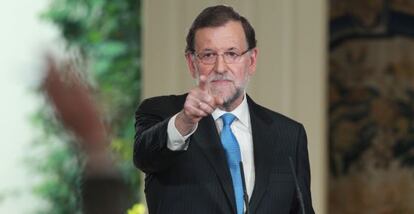PM officially dissolves parliament for December 20 general election
Mariano Rajoy fails to offer proposals to diffuse Catalan political crisis PP leader also declines to talk about possible pacts if his party does not win majority


Prime Minister Mariano Rajoy on Monday sidestepped questions about his political future after signing a resolution formally dissolving parliament ahead of December’s general election.
In comments to reporters after giving a progress report on the achievements of his Popular Party (PP) administration, Rajoy declined to speculate on any plans to form a coalition government with the emerging conservative group Ciudadanos, which has gained strength since the regional and municipal elections in May.
“We will govern according to what the citizens say. That is my offer,” he said, adding that he did not believe in trying to hold on to the prime minister’s office if the PP did not win an absolute majority in parliament.
We will govern according to what the citizens say. That is my offer” Prime Minister Mariano Rajoy
The resolution he signed – approved during a special Cabinet meeting on Monday – officially paves the way for a general election to be held on December 20, a date Rajoy had announced during an interview with Antena 3 television network earlier this month.
Recent polls show that no party, including the PP, will win enough seats in Congress to form a government without the support of other political groupings. The PP currently holds 186 seats in the 350-member chamber.
But tensions are rising between the opponents.
Albert Rivera, the charismatic leader of Ciudadanos, has stated that he will demand Rajoy’s political head if it comes down to the PP and his own party holding discussions about forming a coalition.
When asked about these statements, the prime minister jokingly responded: “My head is well-placed and I am not going to let anyone remove it from where it is.”
This year, voters will have more options to choose from as new parties, including the left-leaning Podemos, enter the national race and challenge Spain’s traditional bipartisan system for the first time since democracy was restored in the 1970s.
Addressing the Catalan political crisis created by premier Artur Mas’s independence drive, Rajoy said that he had no intention of including in his campaign platform any proposal for constitutional reform that might help diffuse the situation in the northeast region. Yet he acknowledged that the Catalan crisis was Spain’s second-biggest problem.
Asked if he was prepared to take emergency measures if the situation flared up while parliament was out of session, the prime minister admitted that he did have a plan.
“Yes, I have some plans – including those that you are thinking about – because that is my duty as a prime minister. Nevertheless in any case, I hope we do not have to take any such action,” he said.
Under the Constitution, the central government could suspend a region’s powers “in order to compel” it to “fulfill the obligations imposed upon it by the Constitution or other laws.” However, prior approval by the Senate would be necessary.
Ask of me what you want, but don’t ask me to abolish the laws because I will never do that”
Rajoy explained that he would look at the other parties’ campaign platforms – including that of Socialist leader Pedro Sánchez, who has called for constitutional reform – before deciding whether he will side with any of the opposition’s proposals for Catalonia.
The PP’s own campaign will tout “jobs, growth and confidence,” he said.
Rajoy reiterated that he was prepared to hold talks with Mas to find a way out of the crisis, but said that Spain’s future, including that of Catalonia, could only be decided by the nation as a whole.
“I have complied with my duties in defending the law, proportionately and with prudence. I have never rejected dialogue and I will never reject speaking to anyone. Ask of me what you want, but don’t ask me to abolish the laws because I will never do so.”
English version by Martin Delfín.
Tu suscripción se está usando en otro dispositivo
¿Quieres añadir otro usuario a tu suscripción?
Si continúas leyendo en este dispositivo, no se podrá leer en el otro.
FlechaTu suscripción se está usando en otro dispositivo y solo puedes acceder a EL PAÍS desde un dispositivo a la vez.
Si quieres compartir tu cuenta, cambia tu suscripción a la modalidad Premium, así podrás añadir otro usuario. Cada uno accederá con su propia cuenta de email, lo que os permitirá personalizar vuestra experiencia en EL PAÍS.
En el caso de no saber quién está usando tu cuenta, te recomendamos cambiar tu contraseña aquí.
Si decides continuar compartiendo tu cuenta, este mensaje se mostrará en tu dispositivo y en el de la otra persona que está usando tu cuenta de forma indefinida, afectando a tu experiencia de lectura. Puedes consultar aquí los términos y condiciones de la suscripción digital.








































